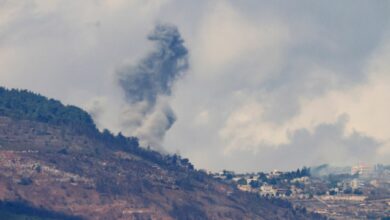Jerusalem — Syria has fought three wars with Israel and maintains close ties to its fiercest enemies in the region, including Iran and the Hamas and Hizbullah militant groups.
So it may come as a surprise that many in Israel view the current unrest convulsing Syria with a wary eye, fearful that a collapse of Bashar Assad's regime might imperil decades of quiet along the shared border.
Israeli leaders, who voiced fears — unfounded so far — that the earlier uprising in Egypt might spell the end of the two countries' peace agreement, are keeping quiet about the tumult that has spread to Syria.
Several officials said that while Israel is closely following the situation in Syria — where mass protests are posing the greatest threat to the Assad family's four decades in power — there is no consensus on how to react or even what the best-case scenario is for Israel.
In Geneva on Monday, President Shimon Peres said only that the unrest "changes the status quo in Israel," while hoping Palestinians and Syrians "will be peaceful and free."
Privately, officials note that Syria has been careful for decades to avoid direct violence, while fighting proxy wars by backing anti-Israel groups like Hamas in Gaza and Hizbullah in Lebanon.
"That has been the working assumption in Israel for years: Better the devil you know than the devil you don't," said Eyal Zisser, director of the Middle East Studies department at Tel Aviv University. "(Syria) scrupulously maintained the quiet. And who knows what will happen now — Islamic terror, Al-Qaeda, chaos?"
Last month, Israel's government watched with trepidation as Egyptians toppled longtime leader Hosni Mubarak, afraid that the ouster of its staunchest Arab ally might put a three-decade-old peace treaty in jeopardy and help to boost Islamists.
Israeli leaders quickly came out in defense of the embattled Mubarak until his last moments in power and issued dire predictions for what a post-Mubarak era might bring. Those fears, so far, have not materialized, and the military rulers who took control of Egypt from Mubarak offered quick reassurance, saying the country would abide by all international agreements, which would include the 1979 treaty.
The desire to see Assad survive appears less intuitive: Assad is closely allied with Israel's bitterest foe, Iran, and harbors and aids the violently anti-Israel groups in Gaza and Lebanon. Earlier this month, Israel's navy seized a ship carrying a load of weapons that it said was sent by Iran and Syria to Hamas militants in the Gaza Strip.
Despite its connections with Israel's enemies, Syria has avoided direct confrontation with Israel for nearly four decades.
With the exception of some air battles in 1982, Israel and Syria have not gone to war since 1973.
Syria has not responded to direct attacks on its soil widely attributed to Israel, including a 2007 airstrike on a suspected nuclear reactor or the assassination of a top Lebanese guerrilla the following year. Israel has never acknowledged carrying out these attacks.
It also has engaged in multiple rounds of peace talks, most recently in 2008. Although these talks have not yielded an agreement, their repeated failure has led to nothing worse than continued chill.
Israeli experts say that instability or regime change in Syria could change this long-standing arrangement, and even tempt Damascus to deflect attention from its internal problems by heating up the Israeli front.
In contrast, some experts in Israel, including Itamar Rabinovich, the former chief negotiator with Syria, say an end to the Assad era could be beneficial.
"Syria is the keystone of the pro-Iran axis," Rabinovich wrote in the Yediot Ahronot newspaper on Sunday. "Weakening the Assad regime, to say nothing of its collapse, would be a blow to Iran, Hamas and Hezbollah."
So far, the protests that started in southern Syria and have since spread to several other parts of the country have not left Assad's regime teetering or even exposed cracks. The security forces appear to be remaining loyal and there have been no defections of diplomats, lawmakers, or military commanders that have occurred in uprisings elsewhere in the Arab world.
Just weeks ago, Assad boasted that his country was immune from the upheaval sweeping through Tunisia and Egypt, in part because he has united Arabs in common cause against Israel.
If the regime were to fall, "this could be a really good message that benefits Israel, that trying to go against Israel and American doesn't give you eternal legitimacy," said Einat Wilf, a lawmaker in Independence, a small faction inside Israel's governing coalition.
The unrest in Syria is expected to put off any prospects of reviving peace talks for now.
Some Israelis, including hardline members of parliament, are breathing a sigh of relief that Israel didn't make peace with a regime that might be headed for extinction. But others say the country may have squandered an opportunity by not engaging Assad.
"There was a golden opportunity because Syria was controlled by one person, Assad, and he was the only one to make decisions and he could have signed an agreement," said Alon Liel, a former diplomat. If Syria splinters into rival factions, "it will be like the Palestinian situation where the Palestinians are split and there is no one to talk to."




